
What is Digital Transformation and Why It Matters in 2025?
In 2025, digital transformation is no longer just about adapting to technology, but about using it as a central strategy to build resilience, drive competitive advantage, and align with new societal values. Instead of merely “doing digital” by adopting new tools, successful businesses are “becoming digital” by fundamentally rewiring their operations, culture, and customer value propositions.
- What is digital transformation in 2025?
Digital transformation is the strategic and continuous integration of digital technology into all areas of a business to drive foundational change. Beyond simply digitizing existing paper-based records, it involves reimagining core business models, customer experiences, and decision-making processes through data-driven and AI-powered technologies. It is not a one-time project, but an ongoing process of innovation.
- Why digital transformation matters in 2025
Customer expectations have evolved beyond just receiving a good product or service. In 2025, customers expect seamless, personalized, and emotionally intelligent experiences across all touchpoints.
- Hyper-personalization: Instead of basic personalization, customers now demand contextual intelligence, where a brand anticipates their needs and delivers a frictionless, meaningful interaction.
- Values-driven loyalty: For Gen Z and younger millennials, a brand’s stance on ethics and sustainability matters as much as its products. Companies are expected to be transparent about their data practices and social impact.
- Effortless experiences: The rise of self-service options, AI-powered chatbots, and smart automation means that speed and simplicity have become non-negotiable for customer loyalty.
- The AI-driven imperative
Artificial Intelligence has moved from an experimental tool to a core component of strategy for most businesses. AI and automation are redefining operational efficiency and innovation.
- Agentic AI: A leading trend for 2025 is the rise of agentic AI, which can automate complex, multi-step workflows. This helps bridge talent gaps by capturing institutional knowledge and delivering significant productivity gains.
- Empowered employees: AI assists human workers rather than replacing them. AI co-pilots can automate routine tasks, empowering employees to focus on high-value, strategic work that requires creativity and human interaction.
- Intelligent decision-making: AI-powered analytics provide valuable, real-time insights from vast datasets, enabling leaders to make faster, more data-driven decisions.
With constant global disruptions, from economic volatility to geopolitical tensions, digital maturity is directly linked to a company’s ability to adapt and survive.
- Operational agility: Cloud ecosystems allow businesses to scale their IT infrastructure on demand, enabling them to be more agile and responsive to market changes. Hybrid cloud models are gaining traction to balance security with scalability.
- Cybersecurity focus: As digital ecosystems expand, so do security threats. Cybersecurity has become a top priority, with companies investing in AI-powered threat detection and zero-trust security models.
